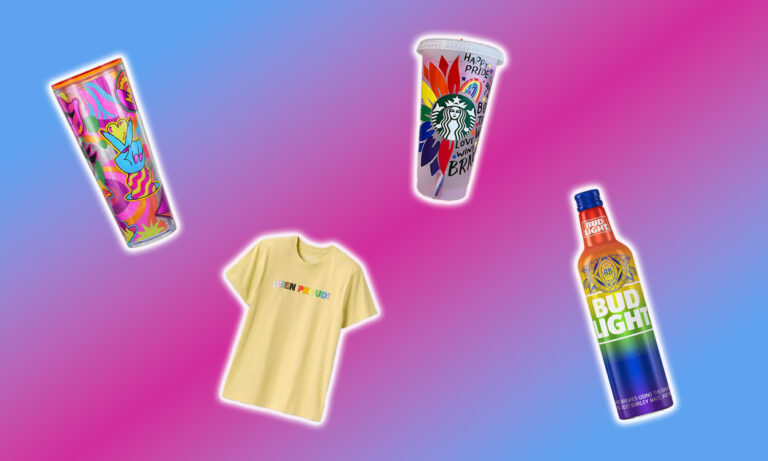How did we go from rainbow washing galore to Pride Month 2023’s complete lack of it?
Rainbow washing is a phrase that’s become commonplace when discussing the ways in which businesses and corporations approach and handle Pride Month and their overall investment in the LGBTQIA+ community. This year, another conversation has arisen. 2023 has seen a complete erasure of companies showing any allyship support whatsoever. Why is this happening? And is it scarier to now exist in a world where even performative activism is being wiped out? Those are the questions we’ll be answering in this explainer.
What is rainbow washing?
While you might not have heard of rainbow washing before, I can guarantee you will have heard of a different variation of the phrase, such as greenwashing. In its most basic form, these terms refer primarily to when organisations, companies, or select individuals, use particular marketing strategies or employ certain phrases or sentiments in order to manipulate consumers into thinking that they are putting dedicated effort in towards helping a particular cause or group of people. In reality, it’s all a performative act.
Rainbow washing in particular refers to when businesses display the LGBTQIA+ flag and publicly impress on people their support for the queer community while not actually engaging in any genuine activism or community help.
More often than not, this occurs during Pride Month, when companies flood their Instagram feeds and TikTok pages with what looks to be queer allyship. But as soon as June comes to a close, their job is done, and no real progress is made. Ultimately, it’s a form of moral bribery and manipulation.
Why is rainbow washing bad?
Rainbow washing is incredibly harmful because it excuses companies from actually making a change and using their political or economic capital for good. Pride Month can be an incredibly transformative and emotionally exhaustive time for LGBTQIA+ individuals, and having brands dilute the importance of this time by superficially adding a rainbow emoji into their IG bios is both condescending and counterproductive.
As aptly put by Pat Law, Singaporean creative director and founder of social media marketing agency Good Stuph, in an interview with Vogue: “It takes more than just a rainbow flag and a bunch of rainbow-themed products to understand what we go through. I don’t care for a CEO telling me she is an ally on LinkedIn. I care when she shares her company policies that ensure an inclusive workplace environment for all her employees.”
Are these companies donating to LGBTQIA+ organisations throughout the year? Do they ensure all policies are completely inclusive and protective of queer employees? These are the questions we need to ask ourselves when considering a brand’s legitimacy regarding any LGBTQIA+ ‘activism’.
Why has there been a decrease in rainbow washing in 2023?
While rainbow washing is an inherently problematic strategy employed by companies who aren’t willing to legitimately engage in meaningful activism, there’s a lot to be said about the complete lack of rainbow washing this year.
It’s no news to anyone that 2023 has been one of the most horrific years in recent times in regard to anti-LGBTQIA+ legislation. Across the entire US, we’ve seen a massive erasure of rights for queer and trans individuals, most prominently in the Southern states. It’s becoming more and more evident that Conservative values and right-wing politics are dominating the social and cultural landscape, so much so that a number of businesses are actively rolling back even performative Pride campaigns in fear of a public backlash.
Some of the brands which have began rolling back Pride-themed items include Target, who pulled a great deal of its Pride collection after staff faced threats of violence from conservative customers, and Starbucks, who removed a number of Pride-themed decorations in one of its Virginia branches.
These are also only a few examples, dozens of companies have been facing torrents of abuse for participating in Pride this year. Things became increasingly volatile and scary after Bud Light partnered with Dylan Mulvany, a trans woman and TikTok creator. The beer company was dethroned as a top-selling beer in the US and, what’s worse, is that instead of outrightly defending the partnership, Bud Light downplayed the collaboration—ultimately caving to the whims of transphobic critics.
Rainbow washing is not okay. But it’s incredibly worrying to see how easily some companies are being swayed by the prospect of a conservative boycott. Performative activism is never a good thing, but isn’t this scenario even worse? We certainly think so.






